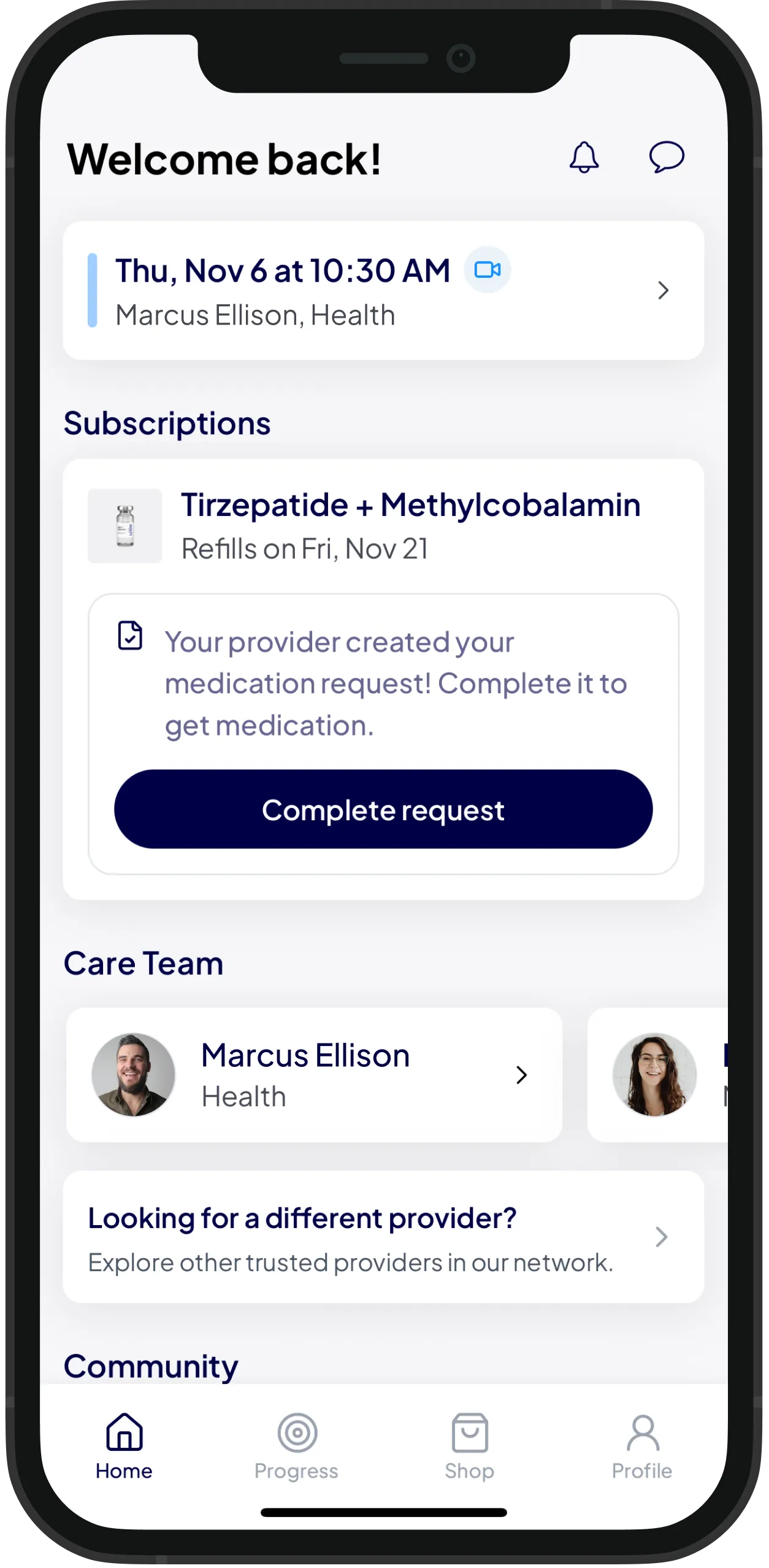Ready to transform your health?
Unlock access to expert guidance and a weight care plan crafted just for you.
Ready to transform your health?
Unlock access to expert guidance and a weight care plan crafted just for you.
Branded medication
Branded medication
Branded medication
Updated on
Updated on
Updated on
Mar 19, 2025
Mar 19, 2025
Mar 19, 2025
Can Ozempic® Cause High Blood Pressure?
Can Ozempic® Cause High Blood Pressure?
Can Ozempic® Cause High Blood Pressure?
Investigate how Ozempic® can affect blood pressure levels and read our tips for managing high blood pressure while taking weight loss medication.
Investigate how Ozempic® can affect blood pressure levels and read our tips for managing high blood pressure while taking weight loss medication.
Investigate how Ozempic® can affect blood pressure levels and read our tips for managing high blood pressure while taking weight loss medication.



Table of Contents
Table of Contents
Table of Contents
Can Ozempic® Lead to High Blood Pressure?
Managing Blood Pressure While Losing Weight
Do Other Weight Loss Medications Affect Blood Pressure?
Key Takeaways
Can Ozempic® Lead to High Blood Pressure?
Managing Blood Pressure While Losing Weight
Do Other Weight Loss Medications Affect Blood Pressure?
Key Takeaways
Can Ozempic® Lead to High Blood Pressure?
Managing Blood Pressure While Losing Weight
Do Other Weight Loss Medications Affect Blood Pressure?
Key Takeaways
Ozempic®, a medication widely recognized for its effectiveness in treating type 2 diabetes, has more recently garnered significant attention in the healthcare community as it’s also used off-label for managing weight loss. (1-3) Its active ingredient, semaglutide, is also used in Wegovy®, which the FDA has approved for treating obesity. Ozempic® works by several mechanisms to regulate appetite and food intake. However, as with any medication, understanding Ozempic®’s potential side effects and impacts on conditions such as high blood pressure is crucial for patients and healthcare providers.
Can Ozempic® Lead to High Blood Pressure?
Currently, no evidence suggests that Ozempic® causes high blood pressure. Studies show that Ozempic® has beneficial effects on cardiovascular health overall and aids in the reduction of some risk factors associated with heart disease. (4,5) Furthermore, several studies have found that semaglutide, the primary active ingredient in Ozempic®, may actually reduce blood pressure rather than raise it. (6) These studies involved individuals without diabetes who were on semaglutide for weight management and revealed notable decreases in blood pressure among individuals, many of whom initially had either normal or only slightly elevated blood pressure levels. (6) Evidence suggests that medications like Ozempic® may result in lower blood pressure, not higher blood pressure. Keep in mind, however, that managing blood pressure is complex and continues to be influenced by other important lifestyle factors like diet, exercise, and stress. However, a good rule of thumb is that losing weight generally leads to lower blood pressure. (7)
Managing Blood Pressure While Losing Weight
If you're taking Ozempic® for weight loss and have concerns about your blood pressure, consider the following tips:
Regular monitoring: Keep track of your blood pressure readings at home and during visits to your healthcare provider.some text
Before measuring your blood pressure, avoid smoking and caffeine, exercise for at least 30 minutes, and relax for several minutes beforehand.
Use a properly fitting cuff to avoid inaccurate readings. The cuff should feel snug as opposed to loose.
When taking your blood pressure, sit upright with your back supported, keep your legs uncrossed with your feet flat on the floor, and have your arm outstretched and resting on a flat surface at heart level.
Balanced diet: A diet rich in fruit, lean protein, whole grains, and vegetables can provide essential nutrients like potassium to support cardiovascular health. (7) Avoiding fats, red meats, sweets, and sugary beverages is also encouraged. Talk to your provider about implementing the DASH diet, which encompasses many of these strategies. (7)
Reduce salt intake: The relationship between sodium intake and blood pressure is well documented. (8) Many trials have shown that reducing sodium consumption also reduces blood pressure. (8-10) Sodium consumption in the US is very high, as many processed foods and restaurant-prepared meals are high in sodium. Try more whole foods or low-sodium options in addition to limiting your table salt consumption when eating.
Regular exercise: Engage in regular, moderate-intensity exercise as recommended by your healthcare provider. Studies show that getting enough exercise is correlated with reduced rates of developing high blood pressure. (11) For the average individual, a sufficient exercise regimen should include at least 20-30 minutes of moderate physical activity daily for five or more days per week.
Limit alcohol: Reducing alcohol intake has also been shown to correlate with decreased blood pressure. (12). Most men should limit alcohol intake to two drinks or fewer per day, while women and individuals with lower body weight should aim for one drink or less. (7). *One drink equals 12 ounces of regular beer or 5 ounces of wine with 12% alcohol content.
Discussing any significant changes or concerns with your healthcare provider is vital. While Ozempic® should help you lose weight and may even help lower your blood pressure, every patient reacts differently.
Do Other Weight Loss Medications Affect Blood Pressure?
Like Ozempic®, other weight loss medications can have various effects on blood pressure:
Medications with stimulants: Unlike Ozempic®, some weight loss drugs contain stimulants, which can increase blood pressure.
Diuretics: Certain weight loss aids include diuretic components that can lower blood pressure by reducing fluid retention.
Appetite suppressants: These can have mixed effects on blood pressure, requiring careful monitoring.
It's important to discuss all options with your healthcare provider, considering the potential benefits and risks based on your individual health status.
Explore other medications here: https://joinmochi.com/medications
Key Takeaways
In conclusion, Ozempic® has not been shown to cause high blood pressure. In fact, the weight loss many achieve while on Ozempic® may actually help lower blood pressure.. Understanding how Ozempic®t fits into your overall treatment plan and making informed decisions with your healthcare provider can help you achieve the best results possible.
If you’re looking to talk to a compassionate medical expert who specializes in weight management, you’re in the right place! Mochi Health’s team of doctors and dietitians can work with you along your GLP-1 treatment journey, offering tailored prescriptions and ongoing care from the comfort of your home. See if you’re eligible for the program today!
This post was written by our team of health writers for informational purposes only and does not constitute medical advice. Always consult your doctor or healthcare provider for personalized guidance regarding your health. Ozempic®, Wegovy®, Mounjaro®®, and Zepbound® and their delivery device are registered trademarks. Mochi Health is a telehealth clinic that offers prescriptions for these products by medical necessity only as determined by a licensed health provider.
Sources
Wilding, J. P. H., Batterham, R. L., Calanna, S., Davies, M., Van Gaal, L. F., Lingvay, I., McGowan, B. M., Rosenstock, J., Tran, M. T. D., Wadden, T. A., Wharton, S., Yokote, K., Zeuthen, N., Kushner, R. F., & STEP 1 Study Group (2021). Once-Weekly Semaglutide in Adults with Overweight or Obesity. The New England journal of medicine, 384(11), 989–1002. https://www.nejm.org/doi/full/10.1056/NEJMoa2032183
Wadden, T.A.; Bailey, T.S.; Billings, L.K.; Davies, M.; Frias, J.P.; Koroleva, A.; Lingvay, I.; O’Neil, P.M.; Rubino, D.M.; Skovgaard, D.; et al. Effect of Subcutaneous Semaglutide vs Placebo as an Adjunct to Intensive Behavioral Therapy on Body Weight in Adults With Overweight or Obesity. JAMA 2021, 325, 1403. https://jamanetwork.com/journals/jama/fullarticle/2777025
Rubino, D.; Abrahamsson, N.; Davies, M.; Hesse, D.; Greenway, F.L.; Jensen, C.; Lingvay, I.; Mosenzon, O.; Rosenstock, J.; Rubio, M.A.; et al. Effect of Continued Weekly Subcutaneous Semaglutide vs Placebo on Weight Loss Maintenance in Adults With Overweight or Obesity. JAMA 2021, 325, 1414. https://jamanetwork.com/journals/jama/fullarticle/2777886
Aroda, V. R., Ahmann, A., Cariou, B., Chow, F., Davies, M. J., Jódar, E., Mehta, R., Woo, V., & Lingvay, I. (2019). Comparative efficacy, safety, and cardiovascular outcomes with once-weekly subcutaneous semaglutide in the treatment of type 2 diabetes: Insights from the SUSTAIN 1-7 trials. Diabetes & metabolism, 45(5), 409–418. https://pubmed.ncbi.nlm.nih.gov/30615985/
Food and Drug Administration. Ozempic® (semaglutide) injection prescribing information, revised 2020. https://www.accessdata.fda.gov/drugsatfda_docs/label/2020/209637s003lbl.pdf
Kennedy, C., Hayes, P., Salama, S., Hennessy, M., & Fogacci, F. (2023). The Effect of Semaglutide on Blood Pressure in Patients without Diabetes: A Systematic Review and Meta-Analysis. Journal of clinical medicine, 12(3), 772. https://www.ncbi.nlm.nih.gov/pmc/articles/PMC9917722/
Appel, L. J., Brands, M. W., Daniels, S. R., Karanja, N., Elmer, P. J., Sacks, F. M., & American Heart Association (2006). Dietary approaches to prevent and treat hypertension: a scientific statement from the American Heart Association. Hypertension (Dallas, Tex. : 1979), 47(2), 296–308. https://www.ahajournals.org/doi/10.1161/01.HYP.0000202568.01167.B6?url_ver=Z39.88-2003&rfr_id=ori:rid:crossref.org&rfr_dat=cr_pub%20%200pubmed
Graudal, N. A., Hubeck-Graudal, T., & Jurgens, G. (2017). Effects of low sodium diet versus high sodium diet on blood pressure, renin, aldosterone, catecholamines, cholesterol, and triglyceride. The Cochrane database of systematic reviews, 4(4), CD004022. https://www.cochranelibrary.com/cdsr/doi/10.1002/14651858.CD004022.pub3/full
Mozaffarian, D., Fahimi, S., Singh, G. M., Micha, R., Khatibzadeh, S., Engell, R. E., Lim, S., Danaei, G., Ezzati, M., Powles, J., & Global Burden of Diseases Nutrition and Chronic Diseases Expert Group (2014). Global sodium consumption and death from cardiovascular causes. The New England journal of medicine, 371(7), 624–634. https://www.nejm.org/doi/full/10.1056/NEJMoa1304127
Filippini, T., Malavolti, M., Whelton, P. K., Naska, A., Orsini, N., & Vinceti, M. (2021). Blood Pressure Effects of Sodium Reduction: Dose-Response Meta-Analysis of Experimental Studies. Circulation, 143(16), 1542–1567. https://www.ahajournals.org/doi/10.1161/CIRCULATIONAHA.120.050371
Warburton, D. E., Charlesworth, S., Ivey, A., Nettlefold, L., & Bredin, S. S. (2010). A systematic review of the evidence for Canada's Physical Activity Guidelines for Adults. The international journal of behavioral nutrition and physical activity, 7, 39. https://www.ncbi.nlm.nih.gov/pmc/articles/PMC3583166/
Xin X, He J, Frontini MG, Ogden LG, Motsamai OI, Whelton PK. Effects of alcohol reduction on blood pressure: a meta-analysis of randomized controlled trials. Hypertension. 2001; 38: 1112–1117. https://www.ahajournals.org/doi/10.1161/hy1101.093424
Ozempic®, a medication widely recognized for its effectiveness in treating type 2 diabetes, has more recently garnered significant attention in the healthcare community as it’s also used off-label for managing weight loss. (1-3) Its active ingredient, semaglutide, is also used in Wegovy®, which the FDA has approved for treating obesity. Ozempic® works by several mechanisms to regulate appetite and food intake. However, as with any medication, understanding Ozempic®’s potential side effects and impacts on conditions such as high blood pressure is crucial for patients and healthcare providers.
Can Ozempic® Lead to High Blood Pressure?
Currently, no evidence suggests that Ozempic® causes high blood pressure. Studies show that Ozempic® has beneficial effects on cardiovascular health overall and aids in the reduction of some risk factors associated with heart disease. (4,5) Furthermore, several studies have found that semaglutide, the primary active ingredient in Ozempic®, may actually reduce blood pressure rather than raise it. (6) These studies involved individuals without diabetes who were on semaglutide for weight management and revealed notable decreases in blood pressure among individuals, many of whom initially had either normal or only slightly elevated blood pressure levels. (6) Evidence suggests that medications like Ozempic® may result in lower blood pressure, not higher blood pressure. Keep in mind, however, that managing blood pressure is complex and continues to be influenced by other important lifestyle factors like diet, exercise, and stress. However, a good rule of thumb is that losing weight generally leads to lower blood pressure. (7)
Managing Blood Pressure While Losing Weight
If you're taking Ozempic® for weight loss and have concerns about your blood pressure, consider the following tips:
Regular monitoring: Keep track of your blood pressure readings at home and during visits to your healthcare provider.some text
Before measuring your blood pressure, avoid smoking and caffeine, exercise for at least 30 minutes, and relax for several minutes beforehand.
Use a properly fitting cuff to avoid inaccurate readings. The cuff should feel snug as opposed to loose.
When taking your blood pressure, sit upright with your back supported, keep your legs uncrossed with your feet flat on the floor, and have your arm outstretched and resting on a flat surface at heart level.
Balanced diet: A diet rich in fruit, lean protein, whole grains, and vegetables can provide essential nutrients like potassium to support cardiovascular health. (7) Avoiding fats, red meats, sweets, and sugary beverages is also encouraged. Talk to your provider about implementing the DASH diet, which encompasses many of these strategies. (7)
Reduce salt intake: The relationship between sodium intake and blood pressure is well documented. (8) Many trials have shown that reducing sodium consumption also reduces blood pressure. (8-10) Sodium consumption in the US is very high, as many processed foods and restaurant-prepared meals are high in sodium. Try more whole foods or low-sodium options in addition to limiting your table salt consumption when eating.
Regular exercise: Engage in regular, moderate-intensity exercise as recommended by your healthcare provider. Studies show that getting enough exercise is correlated with reduced rates of developing high blood pressure. (11) For the average individual, a sufficient exercise regimen should include at least 20-30 minutes of moderate physical activity daily for five or more days per week.
Limit alcohol: Reducing alcohol intake has also been shown to correlate with decreased blood pressure. (12). Most men should limit alcohol intake to two drinks or fewer per day, while women and individuals with lower body weight should aim for one drink or less. (7). *One drink equals 12 ounces of regular beer or 5 ounces of wine with 12% alcohol content.
Discussing any significant changes or concerns with your healthcare provider is vital. While Ozempic® should help you lose weight and may even help lower your blood pressure, every patient reacts differently.
Do Other Weight Loss Medications Affect Blood Pressure?
Like Ozempic®, other weight loss medications can have various effects on blood pressure:
Medications with stimulants: Unlike Ozempic®, some weight loss drugs contain stimulants, which can increase blood pressure.
Diuretics: Certain weight loss aids include diuretic components that can lower blood pressure by reducing fluid retention.
Appetite suppressants: These can have mixed effects on blood pressure, requiring careful monitoring.
It's important to discuss all options with your healthcare provider, considering the potential benefits and risks based on your individual health status.
Explore other medications here: https://joinmochi.com/medications
Key Takeaways
In conclusion, Ozempic® has not been shown to cause high blood pressure. In fact, the weight loss many achieve while on Ozempic® may actually help lower blood pressure.. Understanding how Ozempic®t fits into your overall treatment plan and making informed decisions with your healthcare provider can help you achieve the best results possible.
If you’re looking to talk to a compassionate medical expert who specializes in weight management, you’re in the right place! Mochi Health’s team of doctors and dietitians can work with you along your GLP-1 treatment journey, offering tailored prescriptions and ongoing care from the comfort of your home. See if you’re eligible for the program today!
This post was written by our team of health writers for informational purposes only and does not constitute medical advice. Always consult your doctor or healthcare provider for personalized guidance regarding your health. Ozempic®, Wegovy®, Mounjaro®®, and Zepbound® and their delivery device are registered trademarks. Mochi Health is a telehealth clinic that offers prescriptions for these products by medical necessity only as determined by a licensed health provider.
Sources
Wilding, J. P. H., Batterham, R. L., Calanna, S., Davies, M., Van Gaal, L. F., Lingvay, I., McGowan, B. M., Rosenstock, J., Tran, M. T. D., Wadden, T. A., Wharton, S., Yokote, K., Zeuthen, N., Kushner, R. F., & STEP 1 Study Group (2021). Once-Weekly Semaglutide in Adults with Overweight or Obesity. The New England journal of medicine, 384(11), 989–1002. https://www.nejm.org/doi/full/10.1056/NEJMoa2032183
Wadden, T.A.; Bailey, T.S.; Billings, L.K.; Davies, M.; Frias, J.P.; Koroleva, A.; Lingvay, I.; O’Neil, P.M.; Rubino, D.M.; Skovgaard, D.; et al. Effect of Subcutaneous Semaglutide vs Placebo as an Adjunct to Intensive Behavioral Therapy on Body Weight in Adults With Overweight or Obesity. JAMA 2021, 325, 1403. https://jamanetwork.com/journals/jama/fullarticle/2777025
Rubino, D.; Abrahamsson, N.; Davies, M.; Hesse, D.; Greenway, F.L.; Jensen, C.; Lingvay, I.; Mosenzon, O.; Rosenstock, J.; Rubio, M.A.; et al. Effect of Continued Weekly Subcutaneous Semaglutide vs Placebo on Weight Loss Maintenance in Adults With Overweight or Obesity. JAMA 2021, 325, 1414. https://jamanetwork.com/journals/jama/fullarticle/2777886
Aroda, V. R., Ahmann, A., Cariou, B., Chow, F., Davies, M. J., Jódar, E., Mehta, R., Woo, V., & Lingvay, I. (2019). Comparative efficacy, safety, and cardiovascular outcomes with once-weekly subcutaneous semaglutide in the treatment of type 2 diabetes: Insights from the SUSTAIN 1-7 trials. Diabetes & metabolism, 45(5), 409–418. https://pubmed.ncbi.nlm.nih.gov/30615985/
Food and Drug Administration. Ozempic® (semaglutide) injection prescribing information, revised 2020. https://www.accessdata.fda.gov/drugsatfda_docs/label/2020/209637s003lbl.pdf
Kennedy, C., Hayes, P., Salama, S., Hennessy, M., & Fogacci, F. (2023). The Effect of Semaglutide on Blood Pressure in Patients without Diabetes: A Systematic Review and Meta-Analysis. Journal of clinical medicine, 12(3), 772. https://www.ncbi.nlm.nih.gov/pmc/articles/PMC9917722/
Appel, L. J., Brands, M. W., Daniels, S. R., Karanja, N., Elmer, P. J., Sacks, F. M., & American Heart Association (2006). Dietary approaches to prevent and treat hypertension: a scientific statement from the American Heart Association. Hypertension (Dallas, Tex. : 1979), 47(2), 296–308. https://www.ahajournals.org/doi/10.1161/01.HYP.0000202568.01167.B6?url_ver=Z39.88-2003&rfr_id=ori:rid:crossref.org&rfr_dat=cr_pub%20%200pubmed
Graudal, N. A., Hubeck-Graudal, T., & Jurgens, G. (2017). Effects of low sodium diet versus high sodium diet on blood pressure, renin, aldosterone, catecholamines, cholesterol, and triglyceride. The Cochrane database of systematic reviews, 4(4), CD004022. https://www.cochranelibrary.com/cdsr/doi/10.1002/14651858.CD004022.pub3/full
Mozaffarian, D., Fahimi, S., Singh, G. M., Micha, R., Khatibzadeh, S., Engell, R. E., Lim, S., Danaei, G., Ezzati, M., Powles, J., & Global Burden of Diseases Nutrition and Chronic Diseases Expert Group (2014). Global sodium consumption and death from cardiovascular causes. The New England journal of medicine, 371(7), 624–634. https://www.nejm.org/doi/full/10.1056/NEJMoa1304127
Filippini, T., Malavolti, M., Whelton, P. K., Naska, A., Orsini, N., & Vinceti, M. (2021). Blood Pressure Effects of Sodium Reduction: Dose-Response Meta-Analysis of Experimental Studies. Circulation, 143(16), 1542–1567. https://www.ahajournals.org/doi/10.1161/CIRCULATIONAHA.120.050371
Warburton, D. E., Charlesworth, S., Ivey, A., Nettlefold, L., & Bredin, S. S. (2010). A systematic review of the evidence for Canada's Physical Activity Guidelines for Adults. The international journal of behavioral nutrition and physical activity, 7, 39. https://www.ncbi.nlm.nih.gov/pmc/articles/PMC3583166/
Xin X, He J, Frontini MG, Ogden LG, Motsamai OI, Whelton PK. Effects of alcohol reduction on blood pressure: a meta-analysis of randomized controlled trials. Hypertension. 2001; 38: 1112–1117. https://www.ahajournals.org/doi/10.1161/hy1101.093424
Ozempic®, a medication widely recognized for its effectiveness in treating type 2 diabetes, has more recently garnered significant attention in the healthcare community as it’s also used off-label for managing weight loss. (1-3) Its active ingredient, semaglutide, is also used in Wegovy®, which the FDA has approved for treating obesity. Ozempic® works by several mechanisms to regulate appetite and food intake. However, as with any medication, understanding Ozempic®’s potential side effects and impacts on conditions such as high blood pressure is crucial for patients and healthcare providers.
Can Ozempic® Lead to High Blood Pressure?
Currently, no evidence suggests that Ozempic® causes high blood pressure. Studies show that Ozempic® has beneficial effects on cardiovascular health overall and aids in the reduction of some risk factors associated with heart disease. (4,5) Furthermore, several studies have found that semaglutide, the primary active ingredient in Ozempic®, may actually reduce blood pressure rather than raise it. (6) These studies involved individuals without diabetes who were on semaglutide for weight management and revealed notable decreases in blood pressure among individuals, many of whom initially had either normal or only slightly elevated blood pressure levels. (6) Evidence suggests that medications like Ozempic® may result in lower blood pressure, not higher blood pressure. Keep in mind, however, that managing blood pressure is complex and continues to be influenced by other important lifestyle factors like diet, exercise, and stress. However, a good rule of thumb is that losing weight generally leads to lower blood pressure. (7)
Managing Blood Pressure While Losing Weight
If you're taking Ozempic® for weight loss and have concerns about your blood pressure, consider the following tips:
Regular monitoring: Keep track of your blood pressure readings at home and during visits to your healthcare provider.some text
Before measuring your blood pressure, avoid smoking and caffeine, exercise for at least 30 minutes, and relax for several minutes beforehand.
Use a properly fitting cuff to avoid inaccurate readings. The cuff should feel snug as opposed to loose.
When taking your blood pressure, sit upright with your back supported, keep your legs uncrossed with your feet flat on the floor, and have your arm outstretched and resting on a flat surface at heart level.
Balanced diet: A diet rich in fruit, lean protein, whole grains, and vegetables can provide essential nutrients like potassium to support cardiovascular health. (7) Avoiding fats, red meats, sweets, and sugary beverages is also encouraged. Talk to your provider about implementing the DASH diet, which encompasses many of these strategies. (7)
Reduce salt intake: The relationship between sodium intake and blood pressure is well documented. (8) Many trials have shown that reducing sodium consumption also reduces blood pressure. (8-10) Sodium consumption in the US is very high, as many processed foods and restaurant-prepared meals are high in sodium. Try more whole foods or low-sodium options in addition to limiting your table salt consumption when eating.
Regular exercise: Engage in regular, moderate-intensity exercise as recommended by your healthcare provider. Studies show that getting enough exercise is correlated with reduced rates of developing high blood pressure. (11) For the average individual, a sufficient exercise regimen should include at least 20-30 minutes of moderate physical activity daily for five or more days per week.
Limit alcohol: Reducing alcohol intake has also been shown to correlate with decreased blood pressure. (12). Most men should limit alcohol intake to two drinks or fewer per day, while women and individuals with lower body weight should aim for one drink or less. (7). *One drink equals 12 ounces of regular beer or 5 ounces of wine with 12% alcohol content.
Discussing any significant changes or concerns with your healthcare provider is vital. While Ozempic® should help you lose weight and may even help lower your blood pressure, every patient reacts differently.
Do Other Weight Loss Medications Affect Blood Pressure?
Like Ozempic®, other weight loss medications can have various effects on blood pressure:
Medications with stimulants: Unlike Ozempic®, some weight loss drugs contain stimulants, which can increase blood pressure.
Diuretics: Certain weight loss aids include diuretic components that can lower blood pressure by reducing fluid retention.
Appetite suppressants: These can have mixed effects on blood pressure, requiring careful monitoring.
It's important to discuss all options with your healthcare provider, considering the potential benefits and risks based on your individual health status.
Explore other medications here: https://joinmochi.com/medications
Key Takeaways
In conclusion, Ozempic® has not been shown to cause high blood pressure. In fact, the weight loss many achieve while on Ozempic® may actually help lower blood pressure.. Understanding how Ozempic®t fits into your overall treatment plan and making informed decisions with your healthcare provider can help you achieve the best results possible.
If you’re looking to talk to a compassionate medical expert who specializes in weight management, you’re in the right place! Mochi Health’s team of doctors and dietitians can work with you along your GLP-1 treatment journey, offering tailored prescriptions and ongoing care from the comfort of your home. See if you’re eligible for the program today!
This post was written by our team of health writers for informational purposes only and does not constitute medical advice. Always consult your doctor or healthcare provider for personalized guidance regarding your health. Ozempic®, Wegovy®, Mounjaro®®, and Zepbound® and their delivery device are registered trademarks. Mochi Health is a telehealth clinic that offers prescriptions for these products by medical necessity only as determined by a licensed health provider.
Sources
Wilding, J. P. H., Batterham, R. L., Calanna, S., Davies, M., Van Gaal, L. F., Lingvay, I., McGowan, B. M., Rosenstock, J., Tran, M. T. D., Wadden, T. A., Wharton, S., Yokote, K., Zeuthen, N., Kushner, R. F., & STEP 1 Study Group (2021). Once-Weekly Semaglutide in Adults with Overweight or Obesity. The New England journal of medicine, 384(11), 989–1002. https://www.nejm.org/doi/full/10.1056/NEJMoa2032183
Wadden, T.A.; Bailey, T.S.; Billings, L.K.; Davies, M.; Frias, J.P.; Koroleva, A.; Lingvay, I.; O’Neil, P.M.; Rubino, D.M.; Skovgaard, D.; et al. Effect of Subcutaneous Semaglutide vs Placebo as an Adjunct to Intensive Behavioral Therapy on Body Weight in Adults With Overweight or Obesity. JAMA 2021, 325, 1403. https://jamanetwork.com/journals/jama/fullarticle/2777025
Rubino, D.; Abrahamsson, N.; Davies, M.; Hesse, D.; Greenway, F.L.; Jensen, C.; Lingvay, I.; Mosenzon, O.; Rosenstock, J.; Rubio, M.A.; et al. Effect of Continued Weekly Subcutaneous Semaglutide vs Placebo on Weight Loss Maintenance in Adults With Overweight or Obesity. JAMA 2021, 325, 1414. https://jamanetwork.com/journals/jama/fullarticle/2777886
Aroda, V. R., Ahmann, A., Cariou, B., Chow, F., Davies, M. J., Jódar, E., Mehta, R., Woo, V., & Lingvay, I. (2019). Comparative efficacy, safety, and cardiovascular outcomes with once-weekly subcutaneous semaglutide in the treatment of type 2 diabetes: Insights from the SUSTAIN 1-7 trials. Diabetes & metabolism, 45(5), 409–418. https://pubmed.ncbi.nlm.nih.gov/30615985/
Food and Drug Administration. Ozempic® (semaglutide) injection prescribing information, revised 2020. https://www.accessdata.fda.gov/drugsatfda_docs/label/2020/209637s003lbl.pdf
Kennedy, C., Hayes, P., Salama, S., Hennessy, M., & Fogacci, F. (2023). The Effect of Semaglutide on Blood Pressure in Patients without Diabetes: A Systematic Review and Meta-Analysis. Journal of clinical medicine, 12(3), 772. https://www.ncbi.nlm.nih.gov/pmc/articles/PMC9917722/
Appel, L. J., Brands, M. W., Daniels, S. R., Karanja, N., Elmer, P. J., Sacks, F. M., & American Heart Association (2006). Dietary approaches to prevent and treat hypertension: a scientific statement from the American Heart Association. Hypertension (Dallas, Tex. : 1979), 47(2), 296–308. https://www.ahajournals.org/doi/10.1161/01.HYP.0000202568.01167.B6?url_ver=Z39.88-2003&rfr_id=ori:rid:crossref.org&rfr_dat=cr_pub%20%200pubmed
Graudal, N. A., Hubeck-Graudal, T., & Jurgens, G. (2017). Effects of low sodium diet versus high sodium diet on blood pressure, renin, aldosterone, catecholamines, cholesterol, and triglyceride. The Cochrane database of systematic reviews, 4(4), CD004022. https://www.cochranelibrary.com/cdsr/doi/10.1002/14651858.CD004022.pub3/full
Mozaffarian, D., Fahimi, S., Singh, G. M., Micha, R., Khatibzadeh, S., Engell, R. E., Lim, S., Danaei, G., Ezzati, M., Powles, J., & Global Burden of Diseases Nutrition and Chronic Diseases Expert Group (2014). Global sodium consumption and death from cardiovascular causes. The New England journal of medicine, 371(7), 624–634. https://www.nejm.org/doi/full/10.1056/NEJMoa1304127
Filippini, T., Malavolti, M., Whelton, P. K., Naska, A., Orsini, N., & Vinceti, M. (2021). Blood Pressure Effects of Sodium Reduction: Dose-Response Meta-Analysis of Experimental Studies. Circulation, 143(16), 1542–1567. https://www.ahajournals.org/doi/10.1161/CIRCULATIONAHA.120.050371
Warburton, D. E., Charlesworth, S., Ivey, A., Nettlefold, L., & Bredin, S. S. (2010). A systematic review of the evidence for Canada's Physical Activity Guidelines for Adults. The international journal of behavioral nutrition and physical activity, 7, 39. https://www.ncbi.nlm.nih.gov/pmc/articles/PMC3583166/
Xin X, He J, Frontini MG, Ogden LG, Motsamai OI, Whelton PK. Effects of alcohol reduction on blood pressure: a meta-analysis of randomized controlled trials. Hypertension. 2001; 38: 1112–1117. https://www.ahajournals.org/doi/10.1161/hy1101.093424
Read next
Ready to transform your health?
Unlock access to expert guidance and a weight care plan crafted just for you.

Ready to transform your health?
Unlock access to expert guidance and a weight care plan crafted just for you.

Ready to transform your health?
Unlock access to expert guidance and a weight care plan crafted just for you.


© 2026 Mochi Health
All professional medical services are provided by licensed physicians and clinicians affiliated with independently owned and operated professional practices. Mochi Health Corp. provides administrative and technology services to affiliated medical practices it supports, and does not provide any professional medical services itself.


© 2026 Mochi Health
All professional medical services are provided by licensed physicians and clinicians affiliated with independently owned and operated professional practices. Mochi Health Corp. provides administrative and technology services to affiliated medical practices it supports, and does not provide any professional medical services itself.


© 2026 Mochi Health
All professional medical services are provided by licensed physicians and clinicians affiliated with independently owned and operated professional practices. Mochi Health Corp. provides administrative and technology services to affiliated medical practices it supports, and does not provide any professional medical services itself.






















